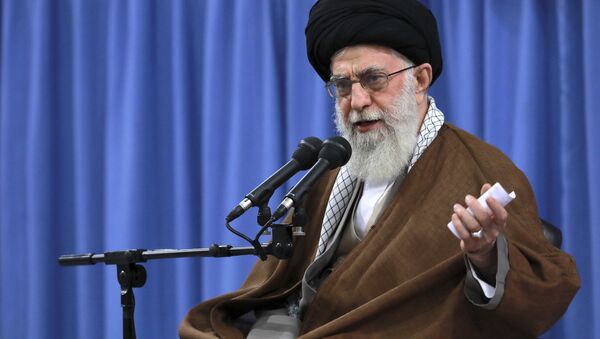Iran's Supreme Leader Ayatollah Seyyed Ali Khamenei has said that the peoples of Iran and Iraq are connected through faith and that an enemy “conspiracy” to create discord between them will not work, as written on his official Twitter account.
"Iran and Iraq are two nations whose hearts & souls are tied together through faith in God, love for Imam Hussein and the progeny of the Prophet (PBUH). This bond will grow stronger day by day", Khamenei said both on his Arabic and English Twitter accounts on Sunday. "Enemies seek to sow discord but they’ve failed and their conspiracy won’t be effective".
#Iran and #Iraq are two nations whose hearts & souls are tied together through faith in God & love for #ImamHussain & the progeny of the Prophet (pbut). This bond will grow stronger day by day.
— Khamenei.ir (@khamenei_ir) October 6, 2019
Enemies seek to sow discord but they’ve failed & their conspiracy won’t be effective. https://t.co/Psya7CJGLB
Millions of Muslims from Iraq, Iran, and around the world are currently preparing to undertake a pilgrimage to the Iraqi holy cities of Najaf and Karbala to attend Arba’een on 19 October - a Shia Muslim religious observance that commemorates the martyrdom of the third Shia Imam, Hussein ibn Ali. The event, which usually gathers more than 20 million participants in Iraq, attracts many pilgrims from all over the world, including Iranians, and is often counted as a symbol of unity between the two nations, which deeply honour Imam Hussein.
Protests in Iraq
The Iranian leader’s remarks come against the backdrop of anti-government protests that Iraq has been facing since Thursday, with demonstrators condemning public corruption and calling for the dismissal of the government. Iraqi Interior Ministry spokesperson Major General Sa'ad Ma'an Mousavi said on Sunday that the death toll following the violent clashes in the country had just reached 104 people, with several thousand wounded. After the statement, at least 15 more were reported dead in the Sadr City residential district of Baghdad on Sunday amid clashes with Iraqi security forces.
In the meantime, Iraqi authorities have claimed that “unidentified snipers” were in place in order to shoot protesters and security forces for the purpose of provoking violence, while some Arab media outlets, as quoted by Press TV, claimed that US-backed plans to instigate internal strife and later install a pro-Washington government in Baghdad had recently been uncovered by the country's security forces. Senior Iranian cleric Ayatollah Mohammad Emami-Kashani also put the blame for the mass protests in Iraq on US and Israeli forces.
Iran and Iraq have historically had a shared border as well as intertwined cultural and religious relations, which, however, worsened following the 1958 revolution in Iraq and the Islamic Revolution in Iran in 1979, after which Iraqi leader Saddam Hussein launched an invasion of some parts of the Islamic Republic following a border dispute. Since 2003, Iraq has allowed Iranian Shia Muslims to undertake pilgrimages to the country's holy sites at Najaf and Karbala. The two nations currently have a number of economic agreements with each other and have become close allies following the joint fight against the Daesh* terrorist group.
*Daesh (ISIL/ISIS/Islamic State/IS), a terrorist group banned in Russia and a wide number of other countries.


